The Best ‘Simpsons’ Episodes #40-31
On April 19, 1987, Homer, Marge, Bart, Lisa, and Maggie made their debut during a short on The Tracey Ullman Show. Two years later, Fox gave them their own program. In the three decades since, The Simpsons has become an American institution. To celebrate the 30th birthday of the greatest set of television characters of all time, let’s look back at the stories behind the 100 best Simpsons episodes.
To compile this list, I sought feedback from both hardcore Simpsons fans and former members of the show’s creative staff. Still, it was an inherently subjective undertaking. "You could choose every other episode from the first 200 episodes for your top 100 and you wouldn’t be too far off," one Simpsons writer told me. I don’t claim to be a scientician, but I tried to be meticulous. So crack open a Duff and enjoy.
Below you’ll find numbers 40 to 31 of our top-100 ranking. Click here for the entire list.
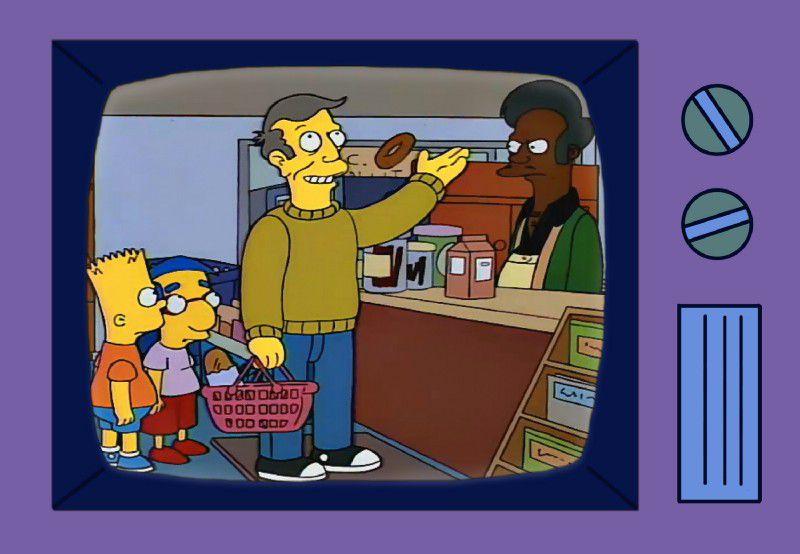
40. "Sweet Seymour Skinner’s Baadasssss Song"
Season 5, Episode 19
Airdate: April 28, 1994
Written by: Bill Oakley and Josh Weinstein
To Bill Oakley and Josh Weinstein, who grew up together in Washington, D.C., Principal Skinner was a composite of the many sad-sack teachers they had in school. Skinner may live with his cranky mom, but at least he has his job. That is until Bart brings Santa’s Little Helper in for show and tell. When he escapes into the school’s air ducts, a greased up Groundskeeper Willie, in a sequence out of Alien, attempts to catch the dog. He fails and ends up falling out of the vent and onto superintendent Chalmers, who fires Skinner.
Bart is remorseful, although Lisa has to explain to him that what he’s feeling is guilt. Meanwhile, Ned Flanders takes over as principal and Skinner begins to unravel. Hopeless, he rejoins the Army. With his sister’s help, Bart comes to a realization. "I think you need Skinner, Bart," Lisa says. "Everybody needs a nemesis." Bart then helps his old principal get his job back with the understanding that their détente will soon end. Skinner may be the most pathetic character on The Simpsons, but this episode shows that he’s worthy of sympathy.
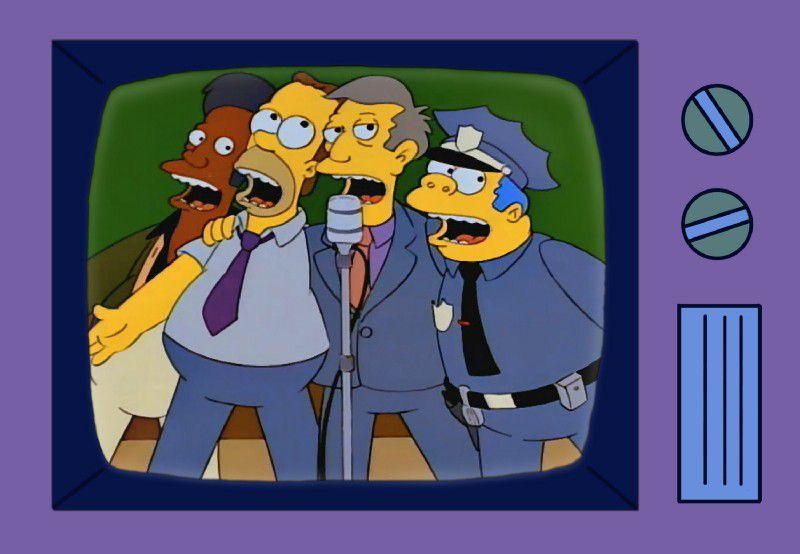
39. "Homer’s Barbershop Quartet"
Season 5, Episode 1
Airdate: September 30, 1993
Written by: Jeff Martin
This is Simpsons music man Jeff Martin’s opus, and it’s a densely packed tribute to the Beatles. In the mid-’80s, Homer, Apu, Skinner, and Barney form the Be Sharps. Disneyland barbershop quartet the Dapper Dans contributed vocals for "Baby on Board," the band’s first hit. There are references to Pete Best (Chief Wiggum is the departed fifth Be Sharp), Let It Be, Yoko Ono, "Revolution 9," and John Lennon’s comment about the Beatles being more popular than Jesus. And when the Be Sharps reunite for one more show on the roof of Moe’s Tavern, guest star George Harrison says, "It’s been done." In Conan O’Brien’s 2013 Simpsons writers roundtable, Martin said that people still ask the Dapper Dans to sing "Baby on Board."
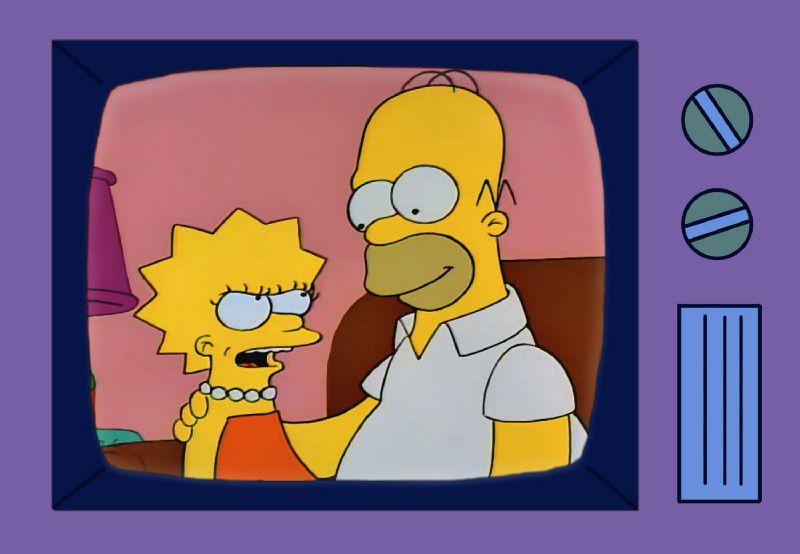
38. "Homer vs. Lisa and the 8th Commandment"
Season 2, Episode 13
Airdate: February 7, 1991
Written by: Steve Pepoon
A man steals cable television and his daughter feels guilty about it. It’s a morality tale for the ’90s. When Homer remorselessly pays $50 for an illegal hookup (the shady cable man gives him an educational pamphlet titled, "So you’ve decided to steal cable"), Lisa has a crisis of conscience. She even worries that watching premium TV will cause her to go to hell. (On the other hand, Bart charges kids 50 cents to watch the adult Top Hat Entertainment channel.) In the middle of a party Homer’s hosting on the night of a big boxing match, his guilt finally strikes. Midway through the fight, he steps outside and disappointedly announces that he’s cutting the cable. "Dad," says Lisa, who throughout The Simpsons is an unfailingly positive influence on her rock-headed father, "we may have saved your soul."
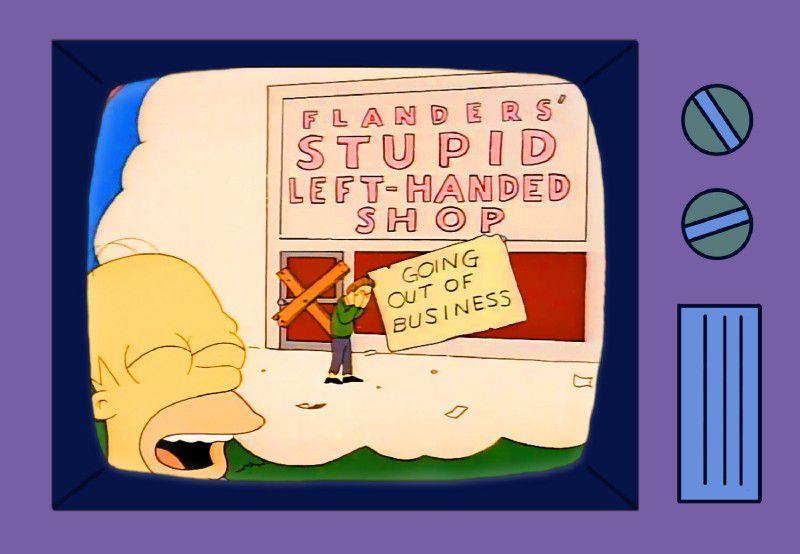
37. "When Flanders Failed"
Season 3, Episode 3
Airdate: October 3, 1991
Written by: Jon Vitti
Everyone has a friend like Flanders. Too smart, too devout, too nice, too damn successful — it all makes you sick. Admit it: Witnessing that person stumble can be satisfying, right? Homer would agree. But leave it to him to take that feeling too far. When Flanders opens a store designed for left-handers (creator Matt Groening is a lefty), Homer takes extreme pleasure in watching it fail. In fact, he refuses to tell lefties he knows about the Leftorium. In typical fashion, he doesn’t stop his nonsense until Ned’s family is almost destitute. Only then does Homer help his neighbor.
"When Flanders Failed" is also a good example of how the show influenced American life, right down to our vocabularies. When Homer gloats about the Leftorium’s lack of success during a family dinner, Lisa asks her father if he knows what schadenfreude is. He says he doesn’t and then sarcastically groans that he’s dying to find out. She responds with, "It’s a German term for ‘shameful joy,’ taking pleasure in the suffering of others." At that time, the word had mostly faded from the lexicon. Since then it’s returned. "Part of the credit has to go to the Germans for coming up with an awesome word," writer Jon Vitti told The Wall Street Journal in 2015. The other part goes to The Simpsons.
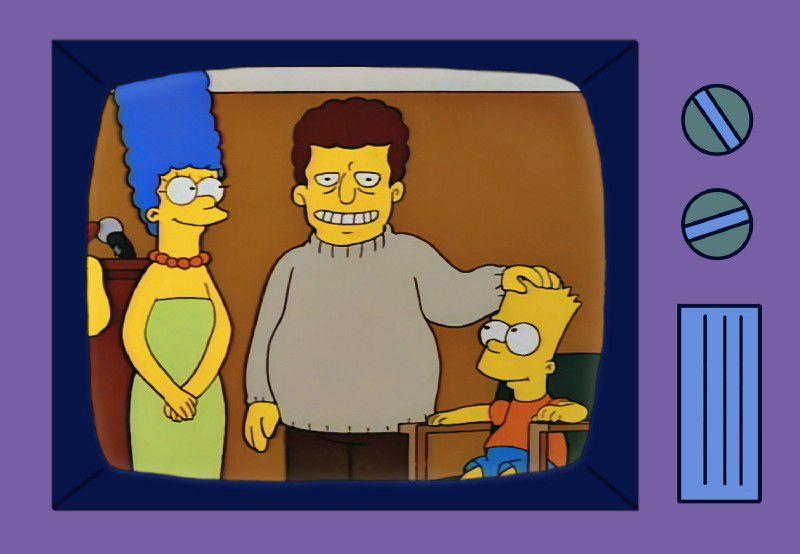
36. "Bart’s Inner Child"
Season 5, Episode 7
Airdate: November 11, 1993
Written by: George Meyer
The Simpsons takes on the self-help craze. Über-guest star Albert Brooks returns to play another memorable one-off role: touchy-feely guru Brad Goodman, whose video seminars help Marge relax. The family then attends a Goodman lecture. Completely unimpressed, Bart threatens to walk out. Goodman calls him up on stage and asks him why. "I do what I feel like," he says. Goodman praises Bart and co-opts his shtick, ordering people to "be like the boy."
After the initial euphoria — "Today I am a god," he tells Lisa — Springfield’s newfound irreverence ends up depressing Bart. After all, the whole town has stolen his one-of-a-kind persona. Even Milhouse is cracking jokes. When the "Do What You Feel" festival (formerly the "Do As We Say" festival) collapses due to collectively shirked responsibility, everyone blames Bart. In the final scene, the Simpsons argue over what lesson they’ve learned. To me, it’s clear: In this world, there’s room for only one Bart Simpson.
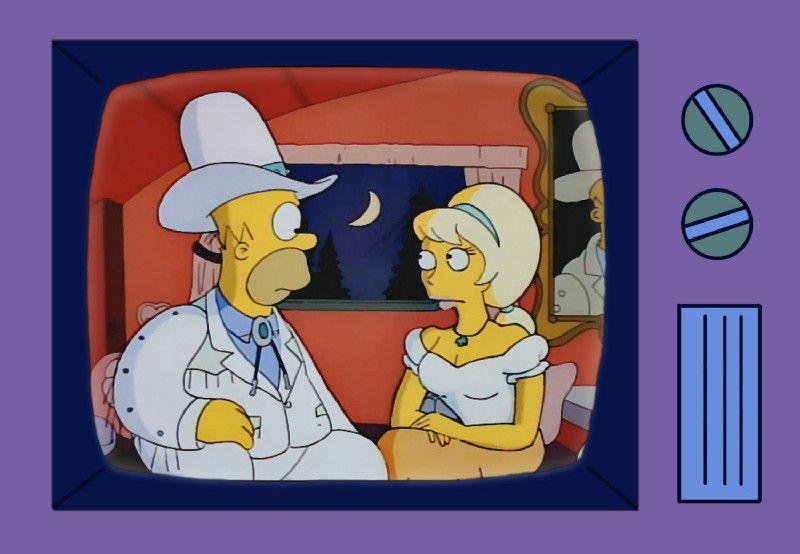
35. "Colonel Homer"
Season 3, Episode 20
Airdate: March 26, 1992
Written by: Matt Groening
Homer transforms into Colonel Tom Parker — "They don’t call me Colonel Homer because I’m some dumbass Army guy," he says — and discovers country singer Lurleen Lumpkin. The character is voiced by Beverly D’Angelo, who played Patsy Cline in Coal Miner’s Daughter. As Lurleen’s star rises, she falls in love with her new manager. One of her songs, which D’Angelo wrote, is called "Bagged Me a Homer." Homer believes in Lurleen, but sells her contract after realizing that he doesn’t want to lose his family.
Matt Groening has sole writing credit on one episode: "Colonel Homer." In it, there’s also an example of George Meyer’s brilliance. Early on, at the Beer-N-Brawl saloon where Homer meets Lurleen, two burly dudes start to scrap. "Hey you, let’s fight," one says before the other replies, "Them’s fightin’ words!" In a Simpsons writers roundtable hosted by Conan O’Brien in 2013, former staffer Jeff Martin marveled at the simplicity of the exchange. "George would write jokes that just seemed so classic sometimes," he said. "[How] had I never heard that?"
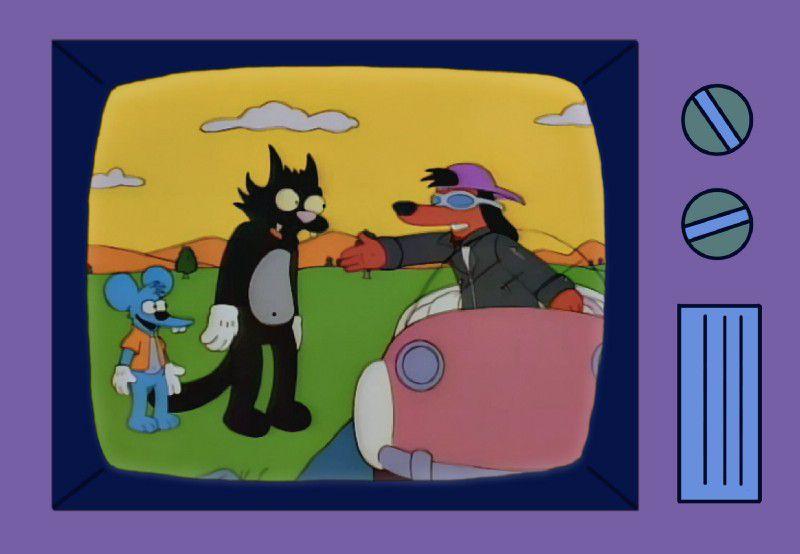
34. "The Itchy & Scratchy & Poochie Show"
Season 8, Episode 14
Airdate: February 9, 1997
Written by: David X. Cohen
Fans often complain that The Simpsons isn’t as good as it used to be. But even at its peak, the series faced both internal and external detractors. At one point, Fox asked Seasons 7 and 8 showrunners Bill Oakley and Josh Weinstein to freshen things up by adding a teenager to the main cast. "I think there were a certain number of people appalled by that notion," Oakley said in 2016. Meanwhile, some early internet adopters were taking to message boards and stridently claiming that their favorite program was tanking. Finally, the writers responded by giving the world a glimpse of what it’s like trying to live up to the show’s ridiculously high standard.
In the meta-episode, a third character is shoehorned into stale cat-and-mouse cartoon Itchy & Scratchy. The Homer-voiced Poochie, who one vacuous executive envisions as "the original dog from hell" (not Cerberus), is supposed to boost ratings. His presence, however, ends up pissing off the cartoon-within-a-cartoon’s die-hard followers, including proto-troll Comic Book Guy, who calls Poochie’s debut the "worst episode ever." (David X. Cohen lifted the now-famous line from a real-life angry post on newsgroup alt.tv.simpsons.)
"The Itchy & Scratchy & Poochie Show" is so funny because it cuts deep. The writers even insert a zany teenager named Roy — the embodiment of network meddling — into the episode. "At the end of that episode," longtime Simpsons animator and producer David Silverman once told MSNBC, "they should have added a note that this is a true story." After only a single appearance, Poochie dies on the way back to his home planet, but not before showing insatiable viewers that they didn’t know how good they had it.
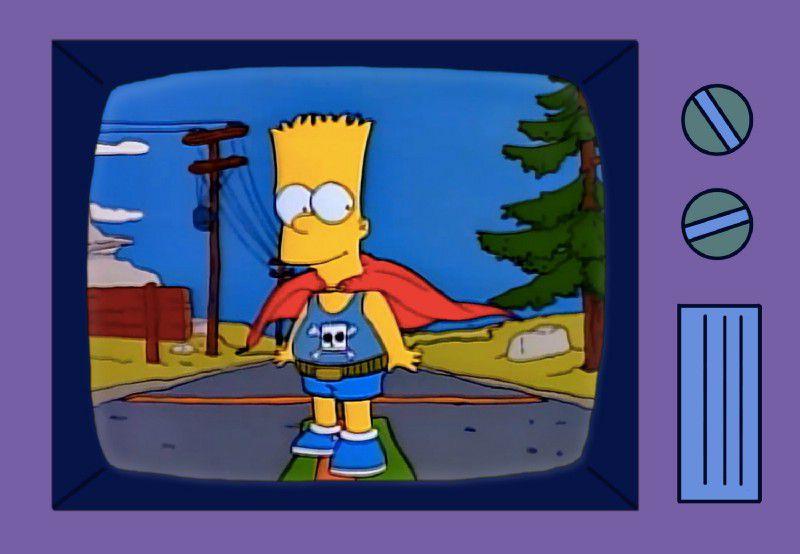
33. "Bart the Daredevil"
Season 2, Episode 8
Airdate: December 6, 1990
Written by: Jay Kogen and Wallace Wolodarsky
Inspired by Evel Knievel clone Lance Murdock, Bart becomes a daredevil. The climactic sequence is spectacular: After talking Bart out of trying to jump Springfield Gorge on his skateboard, Homer accidentally attempts the stunt himself. He doesn’t make it across and suffers the kind of severe injuries that, while funny, still make me wince. The scene is an early reminder to the audience that unlike, say Looney Tunes, The Simpsons took place in a semi-real world.
Creator Matt Groening has called "Bart the Daredevil" his favorite episode. "For me, the funniest moment in the series is when he’s loaded into an ambulance, which then hits a tree, sending Homer back over the cliff while strapped to a gurney," he told Entertainment Weekly in 2000. "Truly inspired mayhem."
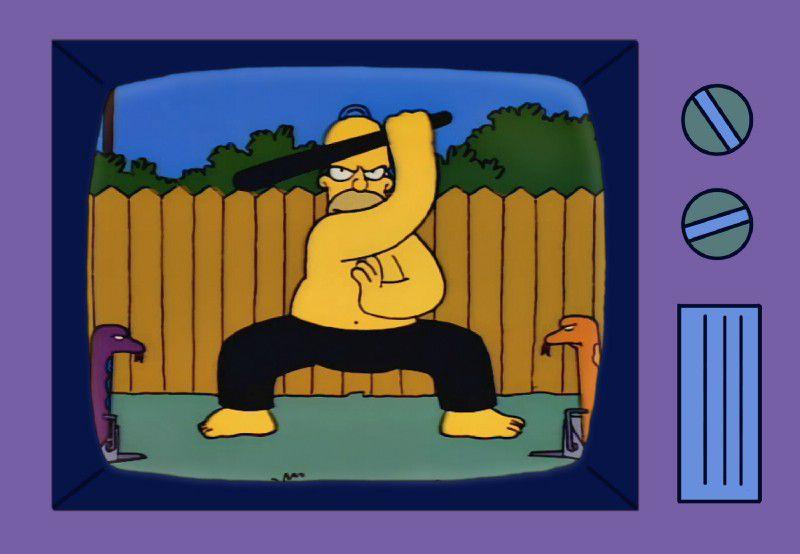
32. "Whacking Day"
Season 4, Episode 20
Airdate: April 29, 1993
Written by: John Swartzwelder
If the episode has a message, it’s that cruelty in the name of tradition is stupid. The episode imparts it in a way that only The Simpsons can: by creating a holiday on which Springfield’s citizens round up snakes and club them to death. Bart, who’s taken to homeschooling after Principal Skinner expels him, learns that town founder Jebediah Springfield didn’t, as was commonly claimed, start Whacking Day in 1775. It really began in 1924 as an excuse to beat up the Irish. Naturally, Bart and Lisa save Springfield’s snakes by recruiting Barry White to sing "Can’t Get Enough of Your Love, Babe." The bass from his baritone voice lures the reptiles to Evergreen Terrace.
"Whacking Day," which itself was reportedly based on a real snake-killing ritual in Texas, inspired an Australian MP to organize an annual event dedicated to eradicating the invasive cane toad. Also: The episode contains one of the best throwaway Simpsons gags ever. After Homer tells Lisa that inside every man is a struggle between good and evil, he imagines himself in a devil costume shaking maracas, dancing on the grave of Good Homer and singing, "I am Evil Homer."
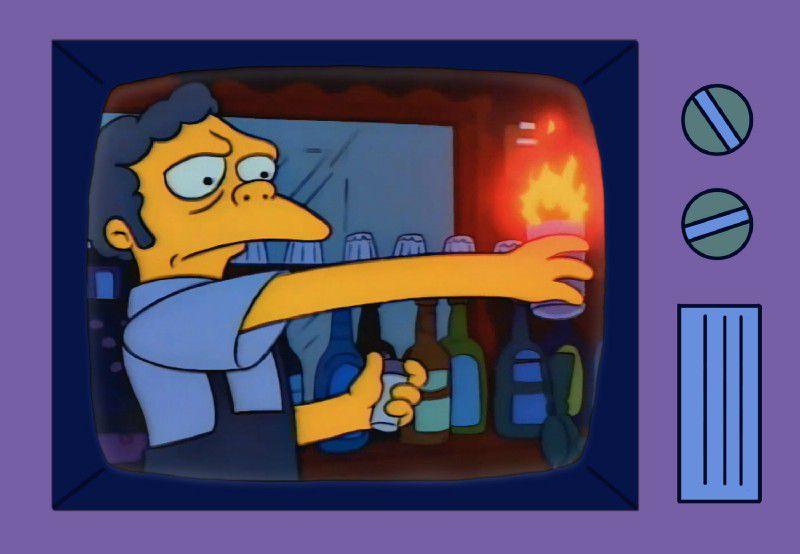
31. "Flaming Moe’s"
Season 3, Episode 10
Airdate: November 21, 1991
Written by: Robert Cohen
A debate over intellectual property has never been so funny. When financially strapped Moe’s Tavern runs out of beer, Homer shows the bar’s downtrodden owner how to mix a drink that he had conceived one night at home when Patty took the last Duff. When an ash from her cigarette accidentally set the concoction ablaze, it transformed into a delicious potion. "I don’t know the scientific explanation," Homer says, "but fire made it good." After Moe and a barfly sample the tasty beverage, the bartender steals all the credit, dubbing it a "Flaming Moe." (For a party in your mouth, try Paste Magazine’s Flaming Moe recipe.)
The new libation turns Moe’s Tavern into Flaming Moe’s, a blend of a handful of pop culture’s most famous bars. Aerosmith shows up to play, and Moe hires a waitress modeled after Diane from Cheers. (Jeff Martin’s parody of the Cheers theme is amazing.) Meanwhile, a deranged Homer grows angrier and angrier at Moe for getting rich off his idea and starts seeing his former friend’s face and voice everywhere. Before Moe can sell the rights to the drink’s recipe for $1 million — he plans to split the cash with its inventor — Homer vengefully reveals the secret ingredient: Krusty’s Non-Narkotik Kough Syrup for kids.
Also, here’s a clip of the members of Aerosmith recording their parts:
Click here for episodes 30 to 21.
Return to The Ringer’s 100 Best ‘Simpsons’ Episodes.


